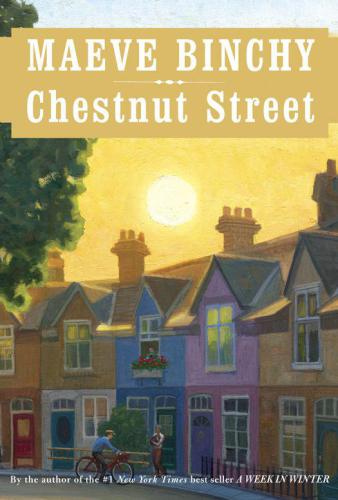
Chestnut Street
کتاب های مرتبط
- اطلاعات
- نقد و بررسی
- دیدگاه کاربران
نقد و بررسی

February 24, 2014
This posthumously published collection of stories revolving around an imaginary street in Dublin was written by Binchy (A Week in Winter) over a period of decades, and approved by her husband, writer Gordon Snell. The earlier stories are more developed than some of the later tales, but overall, the author gives us one last extraordinary look at ordinary people as they struggle with family relationships, romances gone awry, and the possibility for a better future. Standouts include the first story, “Dolly’s Mother,” in which a shy, unassuming teenager copes with having a kind, charismatic mother who is more popular than she is, and—as is revealed—might not be as perfect as everyone thinks. In “It’s Only A Day,” Binchy fondly portrays the transformation of three childhood friends into adults, using the lens of their disparate views on romance, as old-fashioned values find a place in their modern worlds. The book is filled with vignettes in which dissatisfied husbands leave their wives, but find their new lives wanting; disparate people find common ground, and even romance; and holding one’s tongue leads to the best way to make relationships thrive. While some entries come off more as character studies than actual stories, one finds here insightful observations about human nature—all with Binchy’s thoughtful and loving touch that will be sorely missed.

March 15, 2014
A variable, posthumous collection of loosely linked short stories from the much cherished Irish writer who died in 2012. Thirty-six tales of differing length, predictability and quality, generally focused on female characters--wives and mothers, partners, singletons, daughters and friends--make up this late addition to the Binchy oeuvre and explore domestic problems ranging from cranky relatives and problem children to unexpected attractions, and, most often, insensitive and/or faithless men. Binchy's wise insights and wicked humor are visible now and then, for example in the cheerily sparring dialogue of "Fay's New Uncle" and the teacher looking for mischief in "A Problem of My Own," but too often there's a sense of datedness, superficiality or simple fairy tale. Homilies are delivered often: about freedom in "Liberty Green," about finding a real father figure in "A Card for Father's Day," about being over-organized in "Flowers from Grace." Nevertheless, the author's compassion extends widely, notably to the many cheated-upon wives, girlfriends and children, as in "Taxi Men Are Invisible," when a driver finds himself observing an affair, or "Reasonable Access," which views divorce from the confused child's point of view, or "The Gift of Dignity," one of the few longer, more emotionally complex stories, which contemplates, from a friend's perspective, a silent wife's possible collusion in her husband's adultery. Chestnut Street itself, a semicircle of 30 small houses in Dublin, plays a minor but constant role, as safe harbor to the nurse, the window cleaner, the couples, families and loners and, in "Madame Magic"--a typically tidy offering--a substitute fortuneteller who turns Melly's empty house into a busy home. For Binchy aficionados, a late indulgence; for others, slim pickings.
COPYRIGHT(2014) Kirkus Reviews, ALL RIGHTS RESERVED.

March 15, 2014
Binchy was well-known for creating realistic characters who interact in ordinary ways, in ordinary places. Before her death, in 2012, she had been jotting down short stories here and there featuring a number of different characters who all lived on the same Dublin street, Chestnut Street. This collection was gathered by her editors and approved by her family for publication. Readers meet plain Dolly, who wants to be just like her glamorous mother; Joyce, a model who gets her comeuppance on a blind date with an obese man; and Kevin Walsh, the taxi driver who keeps strangers' secrets. Many of the stories are quite brief (as short as three pages) but serve as lovely character portraits. There is no common plotline moving the stories along, and some stories are stronger than others, but, overall, the collection works well, and her fans will be pleased.HIGH-DEMAND BACKSTORY: Binchy's many fans are sure to line up to read this collection of short stories, especially since they know there will be no more.(Reprinted with permission of Booklist, copyright 2014, American Library Association.)

March 15, 2014
A daughter jealous of her beautiful mother, an estranged and sickly uncle, a teacher tired of solving everyone else's problems, and three women who take a leap of faith by moving in with one another are only a few of the residents of Chestnut Street. This posthumous publication (the author died in 2012) offers a series of vignettes that celebrate the triumphs and sorrows that take place on a modest residential Dublin street. Although this book contains Binchy's trademark writing style, it suffers from an unfortunate lack of substance. Many of the scenes feel incomplete, with Chestnut Street serving as a tenuous link among tales that don't even take place simultaneously. With little to tie the narratives together and a lack of consistency with the characters, it is difficult to develop emotional attachment to any of the street's residents. VERDICT Some readers will be happy to have one more volume from the popular Binchy, but those looking for another Quentins or Tara Road will undoubtedly be disappointed. [See Prepub Alert, 11/15/13.]--Vicki Briner, Westminster, CO
Copyright 2014 Library Journal, LLC Used with permission.

November 15, 2013
Binchy wrote these previously unpublished linked short stories while producing her big novels and Irish Times columns, hoping someday to put together a book based on the comings and goings on a single street. Now they are being published posthumously. Also published posthumously, Binchy's A Week in Winter stayed on the New York Times best sellers list for 12 weeks, reflecting her undiminished popularity.
Copyright 2013 Library Journal, LLC Used with permission.

























دیدگاه کاربران